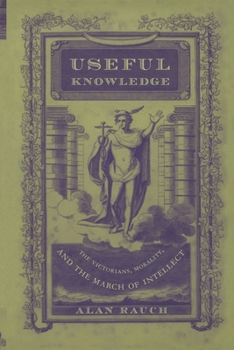Useful Knowledge: The Victorians, Morality, and the March of Intellect
Select Format
Select Condition 
Book Overview
Nineteenth-century England witnessed an unprecedented increase in the number of publications and institutions devoted to the creation and the dissemination of knowledge: encyclopedias, scientific periodicals, instruction manuals, scientific societies, children's literature, mechanics' institutes, museums of natural history, and lending libraries. In Useful Knowledge Alan Rauch presents a social, cultural, and literary history of this new knowledge industry and traces its relationships within nineteenth-century literature, ending with its eventual confrontation with Charles Darwin's Origin of Species.
Rauch discusses both the influence and the ideology of knowledge in terms of how it affected nineteenth-century anxieties about moral responsibility and religious beliefs. Drawing on a wide array of literary, scientific, and popular works of the period, the book focusses on the growing importance of scientific knowledge and its impact on Victorian culture. From discussions of Jane Webb Loudon's The Mummy and Mary Shelley's Frankenstein, to Charlotte Bront 's The Professor, Charles Kingsley's Alton Locke, and George Eliot's Mill on the Floss, Rauch paints a fascinating picture of nineteenth-century culture and addresses issues related to the proliferation of knowledge and the moral issues of this time period. Useful Knowledge touches on social and cultural anxieties that offer both historical and contemporary insights on our ongoing preoccupation with knowledge.
Useful Knowledge will appeal to readers interested in nineteenth century history, literature, culture, the mediation of knowledge, and the history of science.
Rauch discusses both the influence and the ideology of knowledge in terms of how it affected nineteenth-century anxieties about moral responsibility and religious beliefs. Drawing on a wide array of literary, scientific, and popular works of the period, the book focusses on the growing importance of scientific knowledge and its impact on Victorian culture. From discussions of Jane Webb Loudon's The Mummy and Mary Shelley's Frankenstein, to Charlotte Bront 's The Professor, Charles Kingsley's Alton Locke, and George Eliot's Mill on the Floss, Rauch paints a fascinating picture of nineteenth-century culture and addresses issues related to the proliferation of knowledge and the moral issues of this time period. Useful Knowledge touches on social and cultural anxieties that offer both historical and contemporary insights on our ongoing preoccupation with knowledge.
Useful Knowledge will appeal to readers interested in nineteenth century history, literature, culture, the mediation of knowledge, and the history of science.
Format:Paperback
Language:English
ISBN:082232668X
ISBN13:9780822326687
Release Date:July 2001
Publisher:Duke University Press
Length:304 Pages
Weight:1.08 lbs.
Dimensions:0.9" x 6.0" x 9.0"
Customer Reviews
0 rating





